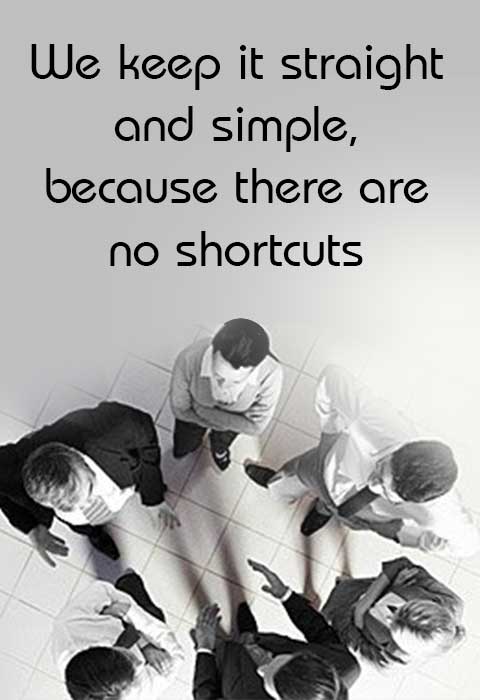Tackling Common HR Problems Faced in SMEs

Small and medium enterprises (SMEs) are busy hives of activity with fast and energised decision making driving action and implementation of ideas. And while business is executed and managed with speed, the focus on pace and delivery can sometimes mean processes are loosely developed or compromised and delivered with shortcuts. Shortcuts to HR process and decisions, in particular, can prove to be costly, and lead to complicated work situations.
It is important to remember that SMEs are evolving spaces, and HR challenges can initially seem minor deterrents that come in the way of business. However, leaders need to note that ignoring these challenges or putting off action steps can prove to be expensive in the long run.
Here, we explore some of the most common HR challenges faced within SMEs and the range of measures that can be implemented to avoid and mitigate them.
Planning and efficiency in hiring
For SMEs the lack of a well-established employer brand can hurt their chances in hiring quality talent from the market. And hasty or ineffectively planned recruitment processes can complicate situations further. To minimise these complexities, it can help to run a check on the overall recruitment process and ensure basic steps such as working with detailed and well-drafted job descriptions are in place.
Sharing well-defined job descriptions which list in detail company information, the nature of the role as well as the duties on the job will allow candidates to be familiar with the expectations on the job and ensure a greater fit with the role.
In addition, it also helps to work on ensuring the right cultural fit. Ensuring a strong cultural fit will allow the right resources to be hired and enable them to start delivering quicker and better from very early in their employment at the organisation.
Building a strong employer brand
As discussed, not all SMEs are able to extend their strong employer brand presence to attract top talent from the market. However, the lack of an employer brand is not to be seen as a challenge associated with size. Size need not be a deterrent for SMEs and HR managers can invest in building the organisation’s employer brand presence through the effective use of online and social platforms.
A robust employer brand will help drive favourable perceptions of the company culture, opportunities for growth and enhanced learning, and engaging work environments.
Focus on employee training
Delivery is a key priority within SMEs, however investing in employee training is not as much. Ignoring employee training needs can be expensive and result in issues such as lack of engagement and falling productivity.
When employees are invested in, they deliver a lot more to their employers. HR managers should design robust channels/ opportunities for learning and enhancement right through the employee journey beginning from the onboarding process.
Early phase mentorships can drive opportunities for rich learning and professional enhancement and translate into superior employee performance. With rich exposure and understanding of their roles and access to the required tools, employees can deliver on their tasks with clarity, competence and high standards of performance.
Ensuring fair and equitable compensation
With a view to attracting and retaining the right talent, SMEs could occasionally build high flexibility into their compensation strategies. The approach while helping to meet immediate and short-term goals can prove to be risky and sub-optimal in managing longer term employee compensation.
Taking the time to invest in a well-researched and equitable market compensation strategy will ensure effective compensation plans and drive employee commitment and increased work satisfaction levels. Executing equitable and well-designed compensation plans will also drive favourable candidate perceptions in the market, and secure the company’s ability to acquire better talent in the long run.
Securing employee performance
In an SME every employee’s performance counts, and ensuring synchronised delivery is a key priority for HR and line managers. Managers, however, may be too preoccupied with everyday schedules to address performance issues or just not have the skills to handle difficult conversations, and any challenges faced are simply swept under the carpet.
When left to fester, performance issues can have a knock-on effect impacting team morale and performance and lead to trust and accountability issues. Setting clear objectives and ensuring that they are managed well with routine reviews and follow up actions can help eliminate these issues. In addition, it is vital that HR facilitate in offering the necessary developmental support and resources to help employees and managers work towards better performance.
Preserving the entrepreneurial mindset
An entrepreneurial culture is important to ensure the success of SMEs – and it helps all employees stay aligned with the leader’s vision for growing the business. However, leaders can get so busy with managing their schedules that making time to communicate with their employees and sharing their vision can take a back seat.
Regular communication initiatives involving leadership interaction allows employees to feel informed and connected with the overall business direction and align their efforts accordingly. Besides, these will also help them stay invested in growing the business and collaborate their efforts to achieve key business goals.
Fostering organisational culture
Finally, and importantly, cultivating and securing a distinctive organisation culture is very valuable to the growth of SME organisations. While developing the organisation’s culture, leaders and managers need to ensure that it resonates with their business’ core values, and can function as a compass that directs and demonstrates to employees and stakeholders “how they would need to get things done around here”.
Investing in a robust organisation culture is vital and can pay huge dividends in the long run including – driving the SME’s brand identity and presence in the marketplace, ensuring better vendor and customer engagement, and attracting the best available talent.
Tackling Common HR Problems Faced in SMEs

Small and medium enterprises (SMEs) are busy hives of activity with fast and energised decision making driving action and implementation of ideas. And while business is executed and managed with speed, the focus on pace and delivery can sometimes mean processes are loosely developed or compromised and delivered with shortcuts. Shortcuts to HR process and decisions, in particular, can prove to be costly, and lead to complicated work situations.
It is important to remember that SMEs are evolving spaces, and HR challenges can initially seem minor deterrents that come in the way of business. However, leaders need to note that ignoring these challenges or putting off action steps can prove to be expensive in the long run.
Here, we explore some of the most common HR challenges faced within SMEs and the range of measures that can be implemented to avoid and mitigate them.
Planning and efficiency in hiring
For SMEs the lack of a well-established employer brand can hurt their chances in hiring quality talent from the market. And hasty or ineffectively planned recruitment processes can complicate situations further. To minimise these complexities, it can help to run a check on the overall recruitment process and ensure basic steps such as working with detailed and well-drafted job descriptions are in place.
Sharing well-defined job descriptions which list in detail company information, the nature of the role as well as the duties on the job will allow candidates to be familiar with the expectations on the job and ensure a greater fit with the role.
In addition, it also helps to work on ensuring the right cultural fit. Ensuring a strong cultural fit will allow the right resources to be hired and enable them to start delivering quicker and better from very early in their employment at the organisation.
Building a strong employer brand
As discussed, not all SMEs are able to extend their strong employer brand presence to attract top talent from the market. However, the lack of an employer brand is not to be seen as a challenge associated with size. Size need not be a deterrent for SMEs and HR managers can invest in building the organisation’s employer brand presence through the effective use of online and social platforms.
A robust employer brand will help drive favourable perceptions of the company culture, opportunities for growth and enhanced learning, and engaging work environments.
Focus on employee training
Delivery is a key priority within SMEs, however investing in employee training is not as much. Ignoring employee training needs can be expensive and result in issues such as lack of engagement and falling productivity.
When employees are invested in, they deliver a lot more to their employers. HR managers should design robust channels/ opportunities for learning and enhancement right through the employee journey beginning from the onboarding process.
Early phase mentorships can drive opportunities for rich learning and professional enhancement and translate into superior employee performance. With rich exposure and understanding of their roles and access to the required tools, employees can deliver on their tasks with clarity, competence and high standards of performance.
Ensuring fair and equitable compensation
With a view to attracting and retaining the right talent, SMEs could occasionally build high flexibility into their compensation strategies. The approach while helping to meet immediate and short-term goals can prove to be risky and sub-optimal in managing longer term employee compensation.
Taking the time to invest in a well-researched and equitable market compensation strategy will ensure effective compensation plans and drive employee commitment and increased work satisfaction levels. Executing equitable and well-designed compensation plans will also drive favourable candidate perceptions in the market, and secure the company’s ability to acquire better talent in the long run.
Securing employee performance
In an SME every employee’s performance counts, and ensuring synchronised delivery is a key priority for HR and line managers. Managers, however, may be too preoccupied with everyday schedules to address performance issues or just not have the skills to handle difficult conversations, and any challenges faced are simply swept under the carpet.
When left to fester, performance issues can have a knock-on effect impacting team morale and performance and lead to trust and accountability issues. Setting clear objectives and ensuring that they are managed well with routine reviews and follow up actions can help eliminate these issues. In addition, it is vital that HR facilitate in offering the necessary developmental support and resources to help employees and managers work towards better performance.
Preserving the entrepreneurial mindset
An entrepreneurial culture is important to ensure the success of SMEs – and it helps all employees stay aligned with the leader’s vision for growing the business. However, leaders can get so busy with managing their schedules that making time to communicate with their employees and sharing their vision can take a back seat.
Regular communication initiatives involving leadership interaction allows employees to feel informed and connected with the overall business direction and align their efforts accordingly. Besides, these will also help them stay invested in growing the business and collaborate their efforts to achieve key business goals.
Fostering organisational culture
Finally, and importantly, cultivating and securing a distinctive organisation culture is very valuable to the growth of SME organisations. While developing the organisation’s culture, leaders and managers need to ensure that it resonates with their business’ core values, and can function as a compass that directs and demonstrates to employees and stakeholders “how they would need to get things done around here”.
Investing in a robust organisation culture is vital and can pay huge dividends in the long run including – driving the SME’s brand identity and presence in the marketplace, ensuring better vendor and customer engagement, and attracting the best available talent.




